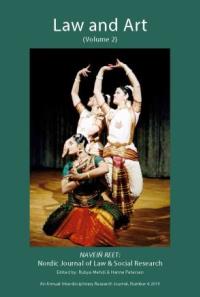Legal and Musical Interpretation – On the historical and systematic elements in the interpretation of law and music
DOI:
https://doi.org/10.7146/nnjlsr.v0i6.111058Abstract
Law and music have inner links in their logical structure and both of them need “interpretation” owing to the “gap” between symbolic system and performance as well as between past and present. In the realms of both Western law and Western music, there are different attitudes towards “loyalty” to historical “authenticity”. On comparing the historical elements in law and music, it becomes clear that subjective historical interpretation is not useless in law and objective interpretation can be acceptable in music under some circumstances as in law. The wisdom from music can also be helpful for legal interpretation in the sense that, if an interpretation seems at first glance “superfluous” in the legal system, this does not necessarily mean it is redundant and must be avoided. On the contrary, it might be a hint that it is an “attentional” provision, which has its own value in the legal system, just like attentional symbols in music, which can be important reminders to performers. Finally, between Chinese traditional music and legal practice, there is an “inner link”, although the formality and completeness of the symbolic systems are no longer common features of the two disciplines.
Downloads
Published
How to Cite
Issue
Section
License
Counting from number 12 (2022), articles published in NNJLSR are licensed under Attribution 4.0 International (CC BY 4.0). Readers are allowed to copy and redistribute the articles in any medium or format, to adapt and revise the articles, and use the articles for commercial purposes, provided that the readers give appropriate credits.
No Creative Commons licenses are applied on articles in number 1 (2009)-11 (2021). All rights reserved by the authors. Readers are allowed to download, read, and link to the articles published in volume 1 (2009)-11 (2021), but they may not republish or redistribute these articles without permission of the authors.

